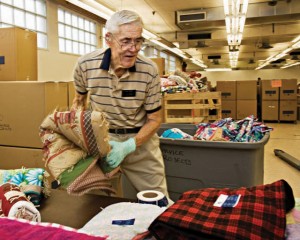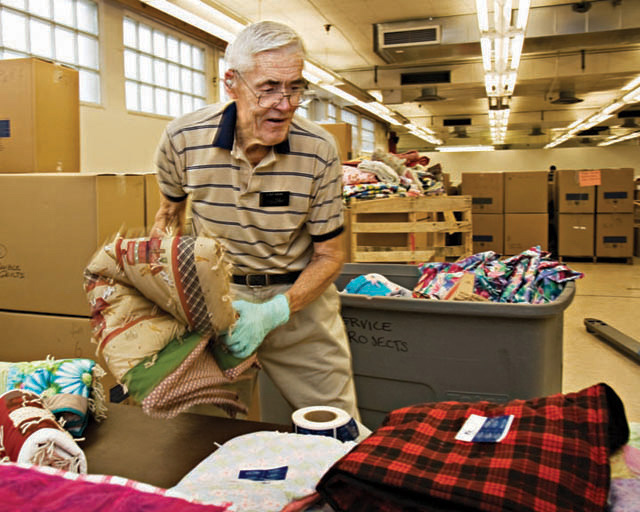In the last few weeks it only took having news releases become news reports with the mention of one word for consumers to go bananas as they headed for the grocery store.(pun intended). The word? Ration!
There had been rumors and reports for weeks, even months, about food shortages in war torn countries. We read reports of greedy warlords keeping food supplies from reaching starving citizens.
 And of course there were all of the political pundits and rhetoric about “the other” candidate’s party being the cause of escalating prices and out-of-site, soaring oil prices causing more shortages, including foods.
And of course there were all of the political pundits and rhetoric about “the other” candidate’s party being the cause of escalating prices and out-of-site, soaring oil prices causing more shortages, including foods.
Within an extremely short time panic had hit the checkout and suddenly many, many people were intensely interested. Not necessarily in a preparedness program, but above all they wanted to get their share of the rice and flour that was no longer going to be available – because of the threat of rationing. And the rationing was immediately accomplished in the stores by cardboard signs proclaiming “LIMIT” 2 – 20# BAGS PER CUSTOMER.” Bags of rice and flour, stacked on carts, were being brought into the store. My husband and I witnessed 20-pound bags of rice, which the week before had cost $3.69, whisked off the cart as people jostled to make sure they got their two bags at $11.99 each! That weekend, just such a short time ago, the same scene played out in every supermarket that we went into, the shelves were depleted of flour and rice.
Of course my warped sense of humor came into play and I thought about all of these many, many customers who had been convinced to load up on lots of rice and flour at highly inflated prices. I wondered what they were going to be able to do with excessive amounts of just rice and flour, especially if the foods they previously purchased had been mostly prepared or partially prepared convenience foods.
Which brings me to the point! Is it Preparedness or Panic? I would suggest that many of those who bought as much rice and flour as they could, bought with a sincerity of heart, but not too much common sense. I would also suggest that fear, driven by marketing strategies is what caused many of those substantial purchases.
Some of you could be thinking, “Well, Barbara, at least something is better than nothing! After all they were trying!” Yes – sort of.
Let me offer a few insights to help if any of you are caught in the position of wanting to buy; knowing that you need to buy, and in many instances feeling pressured because of the headlines and the resulting, rampant tidal wave of panic.
First, be knowledgeable about what you or your family can or can’t eat. Just because a food is being promoted or someone says it is good for you does not mean you should buy it. There is a rule of thumb that must be followed – don’t buy just to be buying, especially when it comes to food! Always consider allergies, food triggers or other dietary problems such as diabetes before
stocking–up.
Next, if you are counting on having a small amount of money or a set amount of money to purchase preparedness items, such as a tax return do not spend it all on one or two items. Stretch it as far as it will go. Stretch it until screams. Remember, according to Barbara, the thrill of the hunt and finding the best way to stock your cupboard is sometimes one of the “best parts” of preparedness.
Variety is a key word. You will hear this emphasized over and over in my blogs. Plan on paper how to stretch your buying power. Rather than buying two 20-pound bags of rice, buy one 10-pound bag rice, some flour, some seasonings, some canned tomato sauce, a small bag of lentils and a few cans of cream soups, as well as some oil and sugar. Or after thinking about it, make your own list. A sufficient amount of a variety of foods could be put back so that you could do more than exist on boiled grain should an emergency arise.
Remember, it is not meant to be food–storage! Make sure that you and your family will consider whatever foods you buy now as edible when you need to eat it. If not it is a total waste of money – and food.
Yes, you must store them, as in take care of them properly. But don’t store them – or just keep them – with the attitude that they can be an inheritance for your great grandchildren. You can be in big trouble if you buy foods to store but not to eat.
If you purchase foods to store, of course, you can always stash them under the bed where the dust bunnies roam. Soon the nests of bunnies can be joined by the colonies of weevil and there will be a regular zoo under there. But … you will have stored your supply.
Another most important point is that you want a preparedness program, not just food! What kind of equipment do you need? What other areas will leave you in the dark if you have not prepared adequately.
We have been taught that even in Book of Mormon days that provisions were required, not just food. . In 1 Nephi 18:6 we read, “ … After we had prepared all things, much fruit and meat from the wilderness and honey in abundance, and provisions according to that which the Lord had commanded us, we did go down into the ship …”
Listen to the news, but more importantly listen to the prophet and plan your preparedness.
And almost as important, remember the chocolate!


